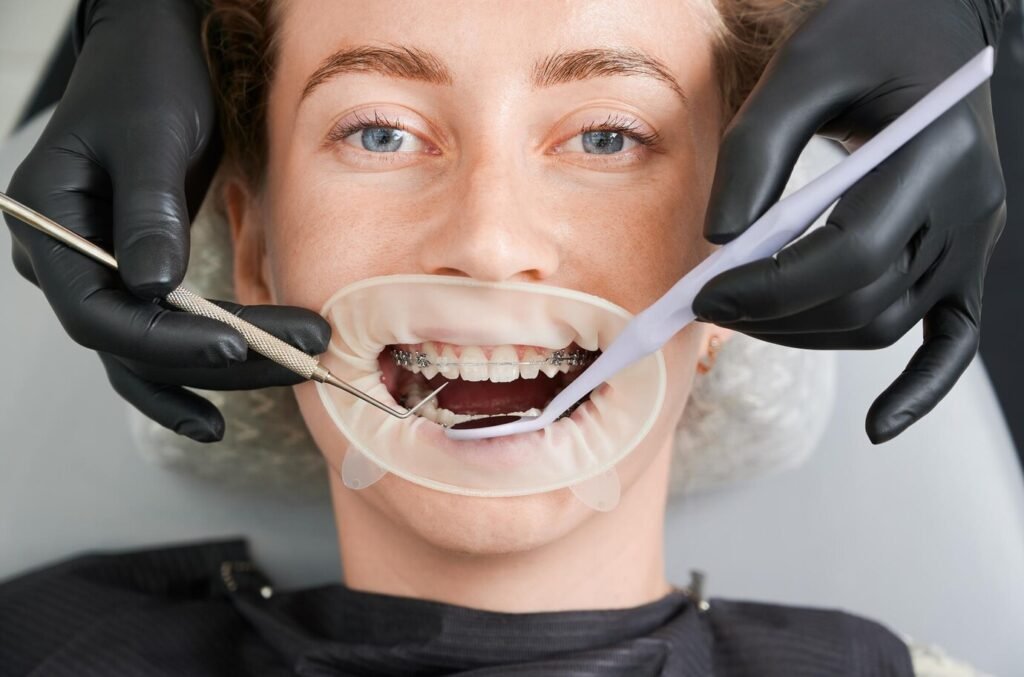Table of Contents
Cosmetic dentistry has grown significantly in popularity, with dental contouring being one of the most sought-after procedures. Known for its ability to enhance smiles quickly and painlessly, contouring has become a go-to solution for those seeking minor corrections to their teeth. However, a critical question often arises: Should teeth be sealed after contouring?
This article dives deep into the procedure of dental contouring, explores the role of sealing, and provides expert insights into whether sealing is necessary after contouring to maintain the health and aesthetics of your teeth.
1. What Is should teeth be sealed after contouring
Dental contouring, also known as tooth reshaping or enameloplasty, is a cosmetic dental procedure designed to improve the appearance of teeth. By gently removing small amounts of enamel, dentists can alter the shape, length, or surface of teeth, enhancing their overall aesthetic.
Why Do People Choose Dental Contouring?
should teeth be sealed after contouring is commonly chosen for:
- Correcting Minor Imperfections: Adjusting chipped, uneven, or misshapen teeth.
- Improving Smile Aesthetics: Creating a more symmetrical and polished appearance.
- Enhancing Bite Alignment: Slight modifications to teeth can improve how they fit together.
- Quick Results: Unlike braces or veneers, contouring offers immediate improvements.
The Procedure in Brief
- Consultation: The dentist examines the teeth to determine if contouring is suitable.
- Shaping and Reshaping: Using a dental drill or laser, small amounts of enamel are removed.
- Smoothing and Polishing: After reshaping, the teeth are polished for a natural finish.
While the procedure is minimally invasive, it involves removing enamel, the protective outer layer of the teeth. This brings us to the critical question: Should teeth be sealed after contouring?
2. Understanding Sealing in Dentistry
What Does Sealing Teeth Involve?
Sealing teeth involves applying a thin, protective layer of dental resin or bonding material to the surface of the teeth. This process is commonly used in dental treatments like fissure sealants to protect vulnerable areas from decay.
Benefits of Sealing Teeth
- Protection Against Sensitivity: Contouring can expose sensitive areas, and sealing helps reduce discomfort.
- Prevention of Decay: The enamel removed during contouring leaves the teeth slightly more vulnerable to decay. Sealing provides an added layer of protection.
- Enhancing Durability: Sealing ensures the reshaped areas remain strong and less prone to damage.
3. Should Teeth Be Sealed After Contouring?
The necessity of sealing teeth after should teeth be sealed after contouring depends on several factors, including the amount of enamel removed, the individual’s oral health, and the dentist’s recommendations. Let’s explore this in more detail.
When Sealing Is Recommended
- Significant Enamel Removal
If a considerable amount of enamel has been removed, sealing is often recommended to protect the tooth from sensitivity and decay. - Increased Sensitivity
Patients who experience heightened tooth sensitivity after contouring may benefit from sealing to shield exposed areas. - Prevention of Future Issues
Sealing can act as a preventive measure, safeguarding teeth against wear, discoloration, and decay in reshaped areas.
When Sealing May Not Be Necessary
- Minimal Reshaping
If the contouring involved only minor adjustments, the natural enamel might still provide adequate protection. - Healthy Enamel
Individuals with strong, healthy enamel may not require additional sealing after contouring. - Proper Oral Care
For those committed to maintaining excellent oral hygiene, sealing might be unnecessary if the dentist determines there’s minimal risk of future issues.
4. Pros and Cons of Sealing After Contouring
Pros
- Added Protection: Shields teeth from sensitivity, decay, and staining.
- Enhanced Longevity: Helps maintain the results of contouring for a longer period.
- Improved Comfort: Reduces post-procedure sensitivity, making it easier for patients to adapt.
Cons
- Additional Cost: Sealing adds an extra expense to the contouring procedure.
- Maintenance: Sealed surfaces may require periodic reapplication to maintain effectiveness.
- Not Always Necessary: In cases of minimal reshaping, sealing might not provide significant additional benefits.
5. Expert Opinions on Sealing After Contouring
To address the question, “Should teeth be sealed after contouring‘ we consulted dental experts. Here’s what they had to say:
Dr. Emily Harris, Cosmetic Dentist
“Sealing after contouring is highly recommended when significant enamel is removed or when patients are prone to sensitivity. It’s a small step that provides big benefits in terms of protection and comfort.”
Dr. Raj Patel, Restorative Dentist
“Not every patient requires sealing after contouring. For minor adjustments, the natural enamel remains sufficient to protect the tooth. However, I always recommend sealing for patients with pre-existing enamel wear.”
Dr. Anna Liu, General Dentist
“Sealing is a preventive measure that can save patients from potential problems down the road. Even if it’s not essential, I often suggest it for peace of mind.”
6. How to Decide if Sealing Is Right for You
Deciding whether to seal your teeth after contouring depends on:
- Your Dentist’s Advice: Always consult your dentist for personalized recommendations.
- Your Oral Health History: If you’ve experienced enamel erosion or sensitivity in the past, sealing may be a good option.
- Your Budget: Discuss the costs of sealing with your dentist to ensure it fits within your budget.
7. Alternative Post-Contouring Care
For those who choose not to seal their teeth, there are other ways to protect and maintain reshaped teeth after contouring:
1. Fluoride Treatments
should teeth be sealed after contouring Regular fluoride applications can strengthen enamel and reduce sensitivity.
2. Desensitizing Toothpaste
should teeth be sealed after contouring Using toothpaste designed for sensitive teeth can alleviate discomfort and protect the reshaped areas.
3. Proper Oral Hygiene
Brushing twice a day, flossing, and regular dental check-ups are crucial for maintaining dental health post-contouring.
8. Risks of Not Sealing Teeth After Contouring

Choosing not to seal teeth after contouring can lead to potential risks, especially in cases where significant enamel removal has occurred. These risks include:
- Increased Sensitivity: Exposed dentin can cause pain or discomfort, particularly when consuming hot or cold foods and drinks.
- Higher Risk of Decay: Without the protective layer of sealing, reshaped teeth may be more vulnerable to cavities.
- Aesthetic Issues: Reshaped areas may stain more easily, affecting the overall appearance of the smile.
9. Frequently Asked Questions
1. Is sealing mandatory after contouring?
No, sealing is not mandatory, but it is often recommended for added protection, especially in cases of significant enamel removal.
2. How long does dental sealing last?
Sealing can last several years, but periodic reapplication may be necessary depending on wear and tear.
3. Can sealing be done later if needed?
Yes, sealing can be applied later if sensitivity or other issues arise after contouring.
10. The Verdict: Should Teeth Be Sealed After Contouring?
The answer to whether teeth should be sealed after contouring depends on individual circumstances. While sealing offers undeniable benefits in terms of protection and comfort, it may not always be necessary for minimal reshaping. The best approach is to consult your dentist, assess your oral health, and make an informed decision based on your specific needs.
For those seeking long-lasting results and peace of mind, sealing is often a worthwhile investment. On the other hand, patients with healthy enamel and minimal reshaping can maintain excellent results with proper oral care and regular dental visits.
Conclusion: A Personalized Approach to Post-Contouring Care
Dental contouring is an effective way to enhance your smile, but post-procedure care is equally important. Whether you choose to seal your teeth or not, maintaining good oral hygiene and following your dentist’s advice will ensure the longevity of your results.
Ultimately, the decision to seal teeth after contouring should be made on a case-by-case basis, with the guidance of a trusted dental professional. By understanding the benefits and limitations of sealing, you can take proactive steps to protect your teeth and enjoy your newly contoured smile for years to come.






